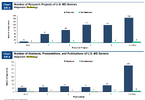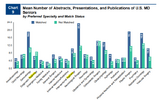Again, just completely wrong. Psychiatrists are brain doctors. Of course neuroscience money involves psychiatric research. The same as pathology research in the brain involving alzheimers has to do with neurology or psychiatry. Or physiology research involving the heart is the basis of cardiology. You’re out of your element here and wrong on all fronts. No, psych research isnt casual where you roll into wearing your swim trunks while you crunch the numbers while catching some waves. Neuroscience is big money. Psychiatry is big on research. There is tons of money poured into basic science in neuroscience and yes this involves psychiatry.
You’re clueless about this. Go back to your med school’s lab, waste your hours pipetting and telling everyone what a big time researcher you have to be as long as you’re not a psychiatrist. Only cancer is real research, Yeah buddy, not in a million years. Anyone with a brain here knows you are wrong.
Well, because you're twisting my words and insist on being combative, I'm done responding after this.
Neuroscience research and psychiatry research exist like a venn diagram. Yes, there is overlap, but there is a lot of separate ground there. Sounds like you really don't understand the breadth of neuroscience research (or psych research, for that matter, since there is tons of psychiatry research that would read like a foreign language to a neuroscientist). Again, brain =/= psych. What an oversimplified take. That's like saying all trauma research is ortho research because sometimes it involves bones. Is there overlap? Sure, but each specialty has it's own domains.
I published a neuroscience article
literally today. If I applied for psych residency with this article, not a single person would say, "Oh wow, great, you've got specialty-relevant research."
Every specialty is big on research.
Medicine is big on research. There is tons of money poured into every specialty, but we're talking about relative amounts here. Psych is average on research and it's a specialty you can match, even quite highly, without research. This is truer in psych than it is in specialties known for demanding research like neurosurgery, neuro, ID, and heme/onc.
As for the "casualness" of research, I may have conveyed that poorly. You will find that even the most hardcore psych researchers typically have a substantial clinical practice. The most hardcore oncologists, immunologists, neurologists, etc... tend to separate nearly entirely from their clinical practice and instead run a lab and focus 90% on research with maybe a few clinic days per month. Top tier academic psych residencies place a higher value on the clinical practice, in my experience, than something like a neuro residency or an oncology fellowship (or PSTP residency), which tend to focus on your potential as a researcher. It's a difference in priorities and culture. Neither is better or worse than the other. And for the record, I never once implied that only cancer research is real research. Cancer research just has
a lot more money flowing to it than psych right now, and if you ask me that's actually a poor reflection on their relative importance.
Funny enough I don't work in "my med school's lab" (if that were even a thing). A lot of weird assumptions going on here, but I hope you see the point I'm making. Neuroscience =/= psych, and psych has a very different culture around research compared to some other specialties.



